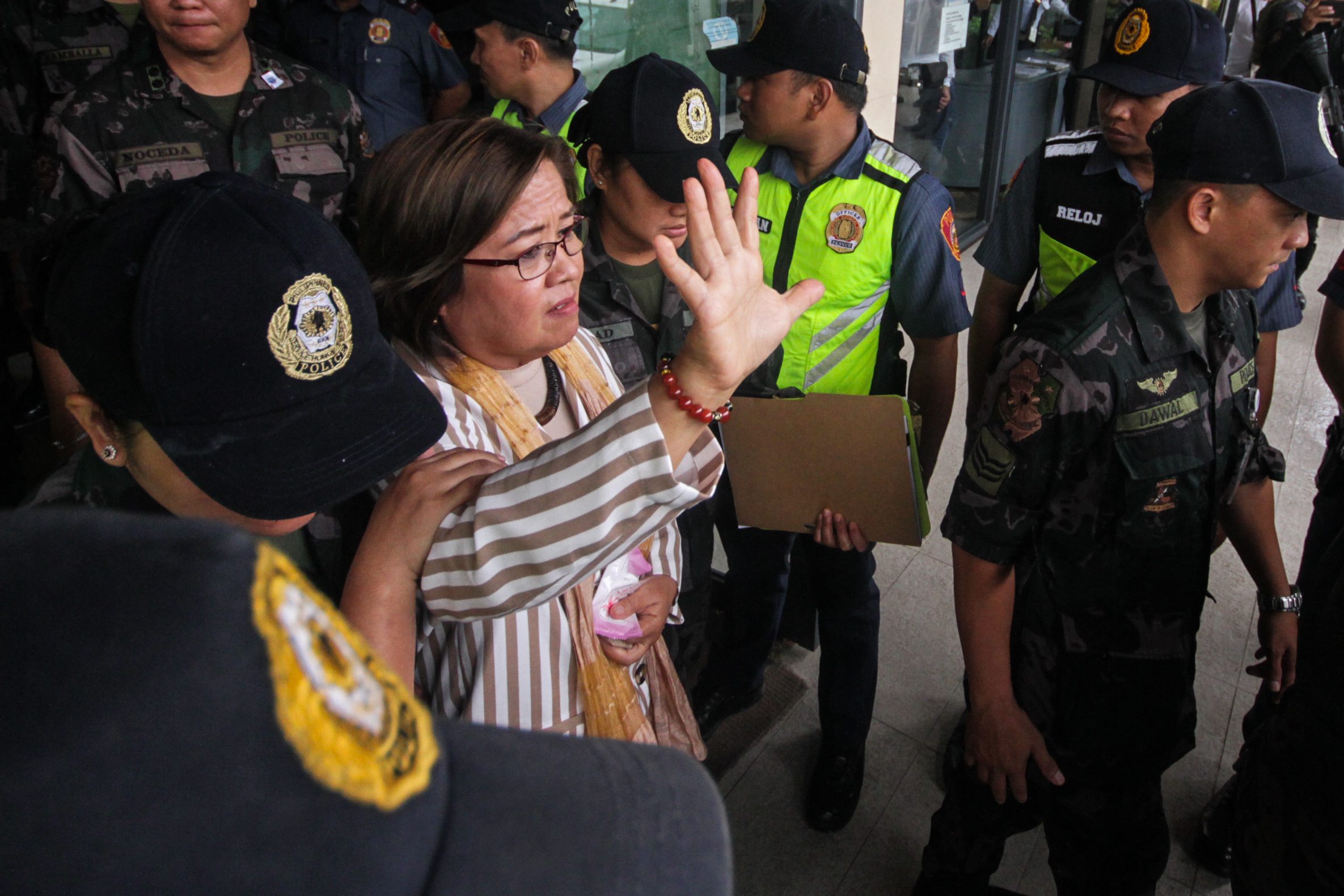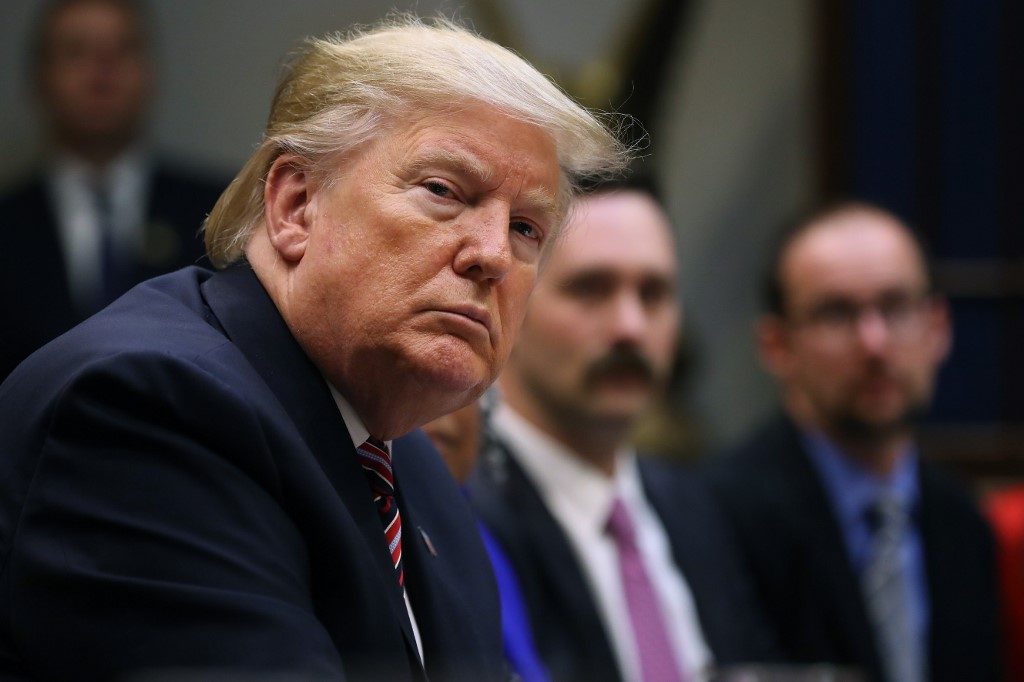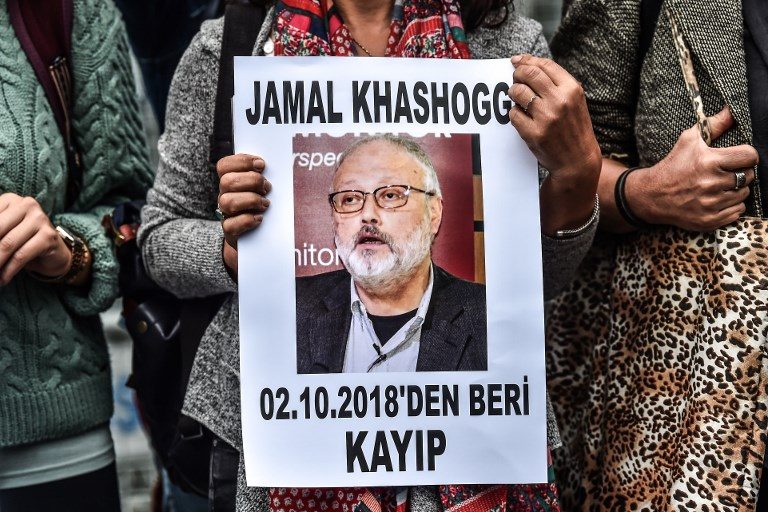SUMMARY
This is AI generated summarization, which may have errors. For context, always refer to the full article.

MANILA, Philippines – United States senators have set in motion a process of sanctioning Philippine officials linked to the detention of opposition Senator Leila de Lima and alleged extrajudicial killings (EJKs) under the Duterte administration.
For one, the US Senate Foreign Relations committee passed a resolution condemning De Lima’s imprisonment and calling out the Philippine government for its “role in state-sanctioned extrajudicial killing by police and other armed individuals as part of the ‘war on drugs.'”
The same resolution declared its opposition to the arrest and detention of human rights defenders and political leaders in the Philippines who have “exercised their right to freedom of expression.” It also denounced the “harassment, arrest, and unjustified judicial proceedings” against media, particularly Rappler and its CEO Maria Ressa.
Beyond putting a spotlight on human rights and press freedom issues in the Philippines, the US Senate resolution 142 included terms of the Global Magnitsky Human Rights Accountability Act, which, if triggered, calls on President Donald Trump to impose sanctions on officials responsible for EJKs and the arrest and detention of De Lima.
The sanctions can come in the form of travel restrictions to the US and the freezing of these officials’ bank accounts and assets in America.
The resolution was authored by US Democrat Senator Edward Markey (Massachusetts) and filed with Senators Marco Rubio (Florida), Richard Durbin (Illinois), Marsha Blackburn (Tennessee), and Chris Coons (Delaware).
Next steps
For sanctions under the Act to take effect, the entire US Senate must pass the resolution which will then task the US president to determine if concerned foreign individuals violated the human rights of De Lima and EJK victims.
The US House of Representatives does not need to pass a counter resolution.
The earliest the resolution can be tackled for the entire US Senate’s adoption is Monday, December 23. According to the US Senate Calendar of Business for this date, the resolution proposing action against officials linked to De Lima’s detention will be the 365th of 397 measures up for the Senate’s consideration.
If no action is taken on the measure this year, this will be carried over to January 2020. By then, however, the US would be faced with various urgent concerns, among them the impeachment trial of President Donald Trump.
Once sanctions under the Global Magnitsky Act are imposed, concerned Philippine officials will be subject to US travel restrictions and will have their US accounts and assets frozen.
How else does the Global Magnitsky Act relate to the Philippines? Here are some things to know:
What is the Global Magnitsky Act?
The Global Magnitsky Act is an expansion of the Magnitsky Act signed in 2012 by former US president Barack Obama.
The law is named after Russian lawyer and auditor Sergei Magnitsky, who uncovered $230 million in massive tax fraud which implicated Russian officials. Magnitsky was jailed in 2008 and later died in 2009 days before his release, after he had been beaten and denied medical treatment while in custody.

The first law that passed, commonly known as the Magnitsky Act, mandated the US State and Treasury department to impose travel restrictions and freeze assets of Russian officials responsible for serious human rights violations.
The Global Magnitsky Act followed in 2016. Under the expanded measure, the executive branch of the US government is given to power to impose visa and travel restrictions and financial sanctions on human rights violators anywhere in the world.
Human Rights Watch (HRW) hailed the law as a “useful tool” that promotes respect for human rights at all levels of the government. The Global Magnitsky Act, they added, functions as a deterrent for foreign officials who resort to “unlawful violence or corruption.”
“By cooperating with the US on Global Magnitsky investigations, foreign leaders can show that they will not tolerate human rights abusers in their own countries,” HRW said.
Elsewhere in the world, other countries are following suit. The UK passed a Magnitsky amendment in 2018. Magnitsky legislation was passed in Estonia in December 2016; Canada and Lithuania in 2017, and Latvia in 2018.
Meanwhile, similar legislation is being pursued in Australia, France, Denmark, the Netherlands, South Africa, Sweden, and Ukraine, among other countries.
Latest developments also saw foreign ministers of the European Union (EU) agree on December 9 to draft the region’s own version of the Global Magnitsky Act.
EU diplomats have said preparatory work for the law can take months, but that this was a significant first step in creating the region’s own human rights system.
How does it work and what is the effect on sanctioned individuals?
In the case of De Lima, the sanctions of the Global Magnitsky Act were included in the provisions of Senate resolution 142 adopted by the US Senate committee on foreign relations last December 11.
For sanctions to take effect after the entire US Senate’s approval of the resolution, a letter of request from a chairman or ranking member of a congressional committee must be sent to the President – who, in this case, is Trump. Upon receiving the request, Trump will have 120 days to determine if foreign individuals in question committed human rights violations.

Trump will need to submit either a classified or unclassified report to the chairperson and ranking member of the committee which submitted the request. The report will include information on whether the President “imposed or intends to impose sanctions with respect
to the person.”
According to the Senate resolution, proposed sanctions cover the following:
- Members of the security forces and official of the Government of the Philippines responsible for exrtajudicial killings
- Officials of the Government of the Philippines responsible for orchestrating the arrest and prolonged detention of Senator De Lima
De Lima, a fierce critic of the Duterte administration, has been imprisoned for over 2 years over drug charges she asserts were fabricated by the government.
Who has been sanctioned under the law so far?
At least 30 people have been subject to sanctions under the Global Magnitsky Act since 2017.

These included 17 individuals linked to the brutal murder of journalist Jamal Khashoggi, leaders of several criminal organizations, and members of Burmese security forces who were involved in the ethnic cleansing in Burma’s Rakhine State.
Aside from these, a Myanmar general who ordered attacks on Rohingya civilians, 3 officials involved in serious human rights abuse or engaged in corruption in Nicaragua, and several Iraqi officials involved in the killing of peaceful protesters were also sanctioned.
What is the effect on Philippines-US relations?
Philippine officials under the Duterte administration said the US Senate committee resolution clearly interferes with domestic affairs.
President Rodrigo Duterte has long distanced himself from the US, the Philippines’ longtime ally, as he moved closer to China.
Foreign Secretary Tedoro “Teddyboy” Locsin Jr described the US Senate resolution as an “idiotic” way to address De Lima’s detention.
“Even a Philippine Senate resolution is not one of the ways of ending a criminal trial; there’s only acquittal or conviction or dismissal by a demurrer to evidence. But a US Senate resolution? Aside from separation of powers there’s the independence of nations,” Locsin said in a tweet last December 15.
Idiotic. Even a Philippine Senate resolution is not one of the ways of ending a criminal trial; there’s only acquittal or conviction or dismissal by a demurrer to evidence. But a US Senate resolution? Aside from separation of powers there’s the independence of nations. https://t.co/2b1LejIiiB
— Teddy Locsin Jr. (@teddyboylocsin) December 14, 2019
De Lima thanked her counterparts in the US Senate, saying the day of reckoning would come for some Duterte administration officials.
“May oras din na matatapos ang rehimeng ito. At pagdating ng panahon na iyon, kayo ang ibabasura ng kasaysayan (There will come a time that this regime would end. When that comes, history will condemn you),” she said. – Rappler.com
Add a comment
How does this make you feel?
There are no comments yet. Add your comment to start the conversation.